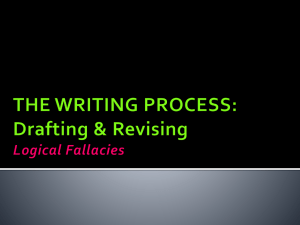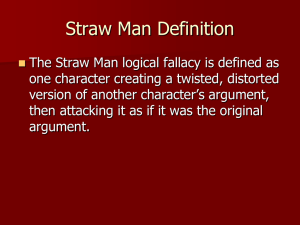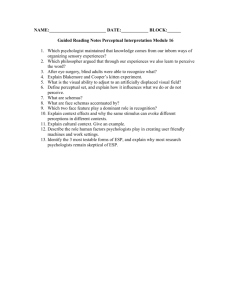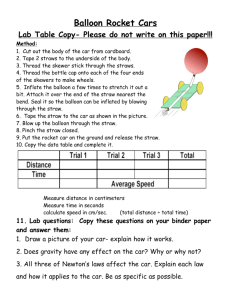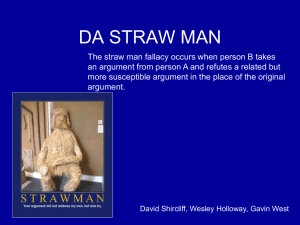Feedback from 5 mark question
advertisement
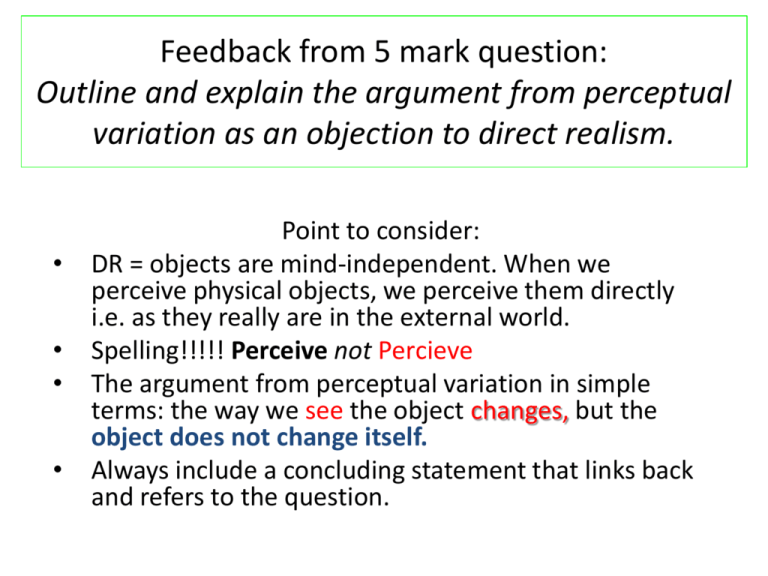
Feedback from 5 mark question: Outline and explain the argument from perceptual variation as an objection to direct realism. • • • • Point to consider: DR = objects are mind-independent. When we perceive physical objects, we perceive them directly i.e. as they really are in the external world. Spelling!!!!! Perceive not Percieve The argument from perceptual variation in simple terms: the way we see the object changes, but the object does not change itself. Always include a concluding statement that links back and refers to the question. Does DR’s responses to the argument from perceptual variation keep DR intact? Create a table and in pairs come up with at least 2 reasons in each side: YES – DR withstands the argument NO – DR does not withstand the from perceptual variation argument from perceptual variation Although we may not perceive the world precisely as it is, does not imply that we don’t perceive it directly. No two people will have the exact same perception of a table: the appearance will change with point of view. Therefore what we will only ever directly perceive is sense-data. Without having prior knowledge of a straw, glass or water, would you perceive the straw to be just as it appears in this image? How could a straw in a glass of water be used to critique direct realism? Task: Using the example above, create an argument in Standard Form – i.e. P1, P2, IC & C – to critique direct realism. Standard form - Example: Premise 1 – All men are mortal. Premise 2 – Socrates is a man. Conclusion – Socrates is mortal. R1. I have a straw, which appears to me to be straight, but when it is half submerged in water it seems to bend and distort. R2. I know that the straw is straight and that its apparent flexibility is a result of its being seen through the water. IC. Yet I cannot change the mental image I have of the straw being bent. C. Since the stick is not in fact bent its appearance can be described as an illusion. I am seeing the straw indirectly. In which part(s) does this argument attack DR? A critique of direct realism: The argument from Illusion – a straw in water R1. When I look at a straw in water, I see something that is bent. R2. The bent thing cannot be the straw itself. IC. So it must be a mental image of the stick – a sense-data. C. But this means I see the straw indirectly, by seeing its sense-data – in which case direct realism is false. In simple terms, in reality I don’t directly perceive the straw itself, but an appearance of the straw. A Critique of Direct Realism: The argument from illusion • It happens on occasion that I perceive an object which appears to be one thing, when in reality it is another i.e. the straw in water. • The conclusion is drawn that what we immediately perceive cannot be what is in the world, since what we are perceiving is not the same as what is really there. • Errors of perception only occur when I make judgments on the basis of sense data concerning what causes them. Can you think of occasions when you have been deceived by your senses in this way? In pairs come up with three examples of perceptual illusions. Which is the better challenge to DR? Argument from perceptual variation OR Argument from illusion? Summarise how direct realists attempt to defend direct realism from the argument from illusion. (Read pp. 33 – 34 in Lacewing) DR response to argument from illusion. • In such situations the senses accurately reveal the world to us, but its just that we misinterpret what we perceive. • The physical object has the property of looking a certain way. Therefore what you perceive is how the physical object looks. • Take the example of the straw in water There is a difference between the property ‘being straight’ and the property ‘looking straight’. Therefore DR argues that sometimes we experience properties they have that don’t directly relate to how they are perceived. Nevertheless, in both cases we are directly perceiving physical objects and their properties. The direct realist’s defence overcomes the criticism put forward by the argument from illusion. How far do you agree with this statement? Discuss it with your neighbour. Be ready to feedback! Outline and explain how direct realists respond to the argument from illusion. (9 marks) What is this question asking you to do?? What is it not asking us to do? How would you structure it? 7 - 9 The answer is set out in a clear, integrated and logical form. The content of the answer is correct. The material is clearly relevant and points are made clearly and precisely. There may be some redundancy or lack of clarity in particular points, but not sufficient to detract from the answer. Technical philosophical language is used appropriately and consistently. 4 - 6 The answer is clear and set out in a coherent form, with logical/causal links identified. The content of the answer is largely correct, though not necessarily well integrated. Some points are made clearly, but relevance is not always sustained. Technical philosophical language is used, though not always consistently or appropriately. 1 - 3 There are some relevant points made, but no integration. There is a lack of precision – with possibly insufficient material that is relevant or too much that is irrelevant 0 Nothing to credit.
